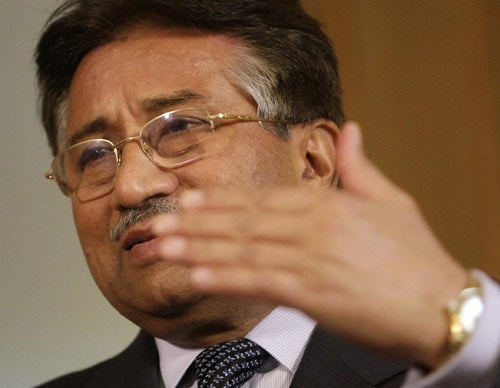Loss of core support means Musharraf's party faces disaster

Your support helps us to tell the story
From reproductive rights to climate change to Big Tech, The Independent is on the ground when the story is developing. Whether it's investigating the financials of Elon Musk's pro-Trump PAC or producing our latest documentary, 'The A Word', which shines a light on the American women fighting for reproductive rights, we know how important it is to parse out the facts from the messaging.
At such a critical moment in US history, we need reporters on the ground. Your donation allows us to keep sending journalists to speak to both sides of the story.
The Independent is trusted by Americans across the entire political spectrum. And unlike many other quality news outlets, we choose not to lock Americans out of our reporting and analysis with paywalls. We believe quality journalism should be available to everyone, paid for by those who can afford it.
Your support makes all the difference.Chaudhry Tahir could scarcely have sounded more confident. "The Chaudhrys are great people," he said of his high-profile cousins who lead the pro-Musharraf Pakistan Muslim League-Q. "We're going to get 200 seats out of 342."
Encircled by supporters on the lawn in front of his office, he said: "The party is popular across Pakistan."
Few outside or even within the party that has ruled Pakistan for the past five years share his view. As Pakistan lurches through the final week of election campaigning, all the opinion polls suggest that the party created by President Pervez Musharraf to buttress his military rule does not enjoy such good fortune.
Indeed, they reveal that support may stand as low as 12 per cent as a resurgent opposition continues to feed on the President's increasing unpopularity.
Amid the falling numbers, the PML-Q is doing everything it can to maintain its once powerful standing. This – according to widespread accusations – includes tilting the electoral playing field in its favour through fair means and foul.
Even in the city of Gujrat – home to the party's leadership and traditionally a source of unwavering support for the government – there are repeated claims of intimidation of both voters and the opposition.
"Gujrat is not a stronghold for the Q, they are forcing it to be a stronghold with the use of police and gunmen," said Mushtaq Pugganwala, a local official with the rival Pakistan's People's Party (PPP). "Yesterday there was a gathering of the PPP. They came over and said 'How dare you have this meeting!'. They slapped people."
Most dramatic among the flurry of allegations targeted at the PML-Q is the use of an armed gang employed by Wajahat Hussain, the local MP and younger brother of the Q party's president, that wears a uniform bearing the logo the "Wajahat Force".
Though adamantly denied by Mr Tahir, many people in Gujrat claim the group have been menacing voters by visiting shopkeepers and members of the public and demanding to know for whom they intend to vote.
"They came in with their guns and members of the party," said storekeeper Tariq Mahmood. "I told them I was going to vote for them. But afterwards, that choice is my decision."
For more than two decades, the Chaudhrys of Gujrat – Shajat Hussain, briefly a prime minister of Pakistan, and Pervez Elahi, chief minister of Punjab – have held an enduring position of power within the political establishment.
First with President Zia ul-Haq, then with Mr Sharif, and most recently with Mr Musharraf, the cousins have unceasingly aligned themselves with the country's conservative forces.
With Mr Musharraf's popularity at an all-time low and with the PPP poised to secure a commanding position after next week's election, the Chaudhrys and allies in the Q party face resounding defeat. This is not lost on the senior members. In contrast to the boundless optimism of Mr Tahir, one senior leader privately conceded: "We're not going to get more than 65 seats."
The falling support for the Q is the result of several factors. One of them is a surge of sympathy for the PPP opposition in the aftermath of Benazir Bhutto's assassination. But more everyday concerns may have been equally important to their traditional supporters across vast stretches of rural Punjab where shortages of electricity, gas and the rising price of wheat flour has triggered anger against the government.
Join our commenting forum
Join thought-provoking conversations, follow other Independent readers and see their replies
Comments